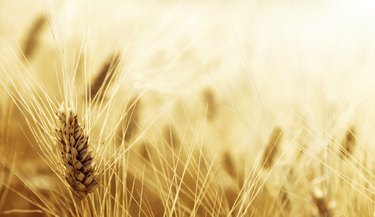
For sufferers of celiac disease or other forms of gluten intolerance, a gluten-free diet can be a lifesaver -- sometimes literally. Gluten, a combination of proteins found in wheat, rye, barley and related grains, can trigger problems ranging from diarrhea to osteoporosis in sensitive individuals. Yet despite potential benefits, the effects of eliminating gluten from your diet aren't always positive. Without proper planning, a gluten-free diet can create nutritional imbalances that lead to constipation, a digestive disorder characterized by infrequent or difficult bowel movements.
Emphasize Magnesium-Rich Foods
Video of the Day
Magnesium plays a vital role in maintaining healthy muscle function -- including the intestinal muscle contractions that help you produce bowel movements. Because wheat and other gluten grains are rich sources of magnesium, gluten-free diets can inadvertently become low-magnesium diets and potentially lead to constipation. When gluten is off the menu, you can boost your magnesium intake by eating nuts, seeds, dark green vegetables, legumes, beets, peas, corn and bananas, which the Cedars-Sinai Medical Center recommend as high-magnesium foods. Although milk is also rich in magnesium, the American Celiac Disease Alliance notes that many individuals with celiac disease also experience lactose intolerance and may need to avoid dairy.
Video of the Day
Find Alternative Sources of Resistant Starch
Resistant starch is a form of indigestible starch that feeds the microbes in your colon, benefiting friendly gut bacteria and promoting regular bowel movements, according to a paper published in the "International Journal of Food Sciences and Nutrition" in January 2009. Research conducted by the Academy of Nutrition and Dietetics found that in America, the most common sources of resistant starch are foods likely to contain gluten, including breads, cereals, pastas, cakes, muffins, pies and waffles. As a result, going gluten-free may curtail your intake of this helpful starch and the constipation-thwarting perks that come with it. To keep your resistant starch intake high enough to promote regularity, you can fill your menu with bananas, plantains, legumes, rice, rolled oats, millet, potatoes, yams and corn tortillas.
Increase Fiber Intake
Both soluble and insoluble fiber are vital for healthy bowel movements -- with soluble fiber providing bulk for stools and insoluble fiber helping food pass through your digestive tract more rapidly, the University of California, San Francisco, Medical Center explains. Because many foods rich in fiber also contain gluten, such as whole-grain bread and wheat bran, a gluten-free diet may promote constipation if your fiber intake declines as a result. Fresh vegetables, legumes, apples, bananas and oats can supply the fiber necessary for staying regular without inviting gluten back to your plate.
Address Nondietary Causes
Although nutrition can play a role in constipation, certain drugs and diseases can also cause changes in bowel habits and may require medical attention rather than treatment through dietary changes. Consult your doctor if you experience pain, fatigue, weight loss, bloody stools or other new and unusual symptoms along with constipation.
- American Celiac Disease Alliance: What Is Celiac Disease?
- Cedars-Sinai Medical Center: Magnesium Rich Foods
- International Journal of Food Sciences and Nutrition: Beneficial Effects of Resistant Starch on Laxation in Healthy Adults
- Journal of the American Dietetic Association (Now the Journal of the Academy of Nutrition and Dietetics): Resistant Starch Intakes in the United States
- University of California, San Francisco, Medical Center: Constipation
- American Chiropractic Association: Magnesium: A Best-Kept Secret
- National Digestive Diseases Information Clearinghouse: Constipation
- National Foundation for Celiac Awareness: The Gluten-Free Diet
Is this an emergency? If you are experiencing serious medical symptoms, please see the National Library of Medicine’s list of signs you need emergency medical attention or call 911.